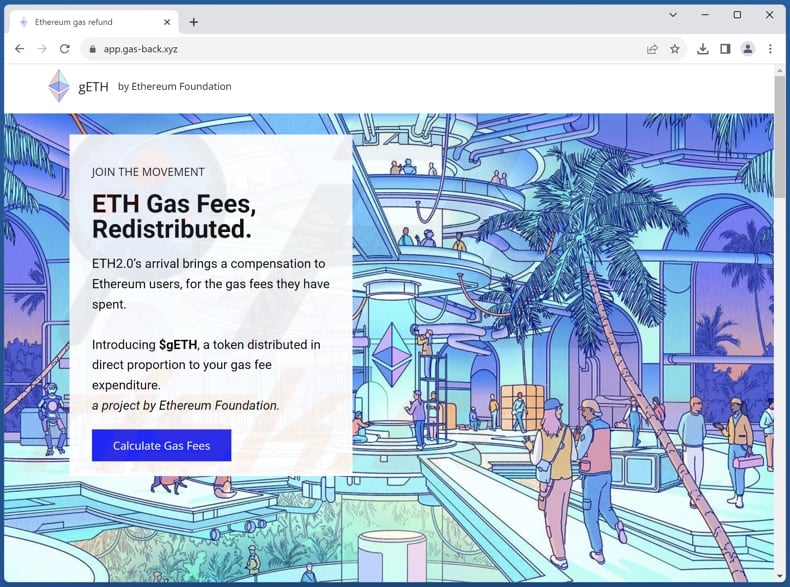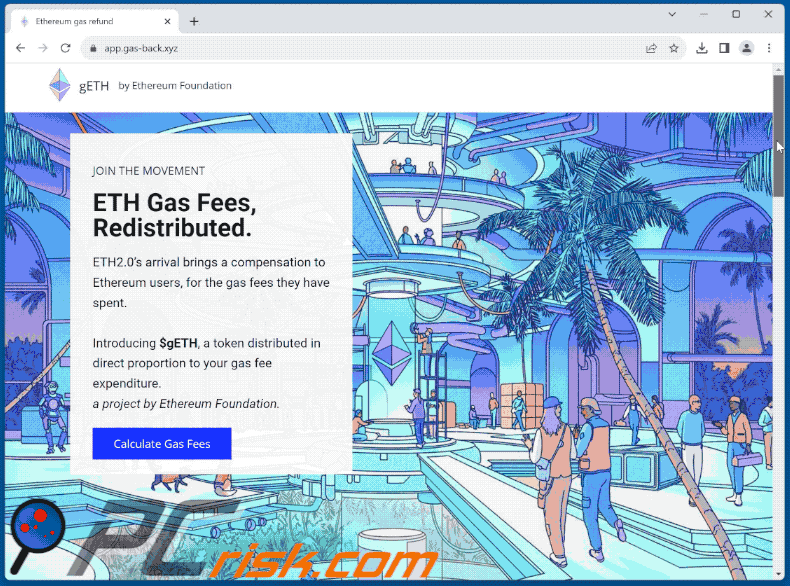How to identify fraudulent schemes like the "$gETH Token" scam
Phishing/ScamAlso Known As: Fake $gETH giveaway
Get free scan and check if your device is infected.
Remove it nowTo use full-featured product, you have to purchase a license for Combo Cleaner. Seven days free trial available. Combo Cleaner is owned and operated by RCS LT, the parent company of PCRisk.com.
What is "$gETH Token" scam?
Our analysis of the site (app.gas-back[.]xyz) determined that it is a scam website masquerading as a legitimate platform. The site's design and content are crafted to appear legitimate, enticing visitors with promises of compensation in digital currency. However, the true purpose of app.gas-back[.]xyz is to steal cryptocurrency from victims.

"$gETH Token" fake compensation platform in detail
The scam operates under the guise of a purported initiative linked to the Ethereum Foundation, enticing users with promises of compensation for gas fees. The webpage presents itself as part of a movement associated with the arrival of Ethereum 2.0, claiming to redistribute gas fees back to users in the form of a token called $gETH.
This token is purportedly distributed based on the amount of Ethereum gas fees spent by individuals. The Ethereum Foundation is reputable, but scammers often exploit its name and the excitement surrounding developments in the Ethereum ecosystem to deceive users.
Despite the seemingly legitimate appearance and claims made on the page, users should exercise caution. The website intends to defraud users through deceptive means. Upon clicking the "Calculate Gas Fees" button, users are instructed to connect their wallets. This action signs a malicious contract designed to activate a cryptocurrency drainer.
When users activate the drainer, their cryptocurrency is siphoned from their wallets and funneled into the hands of scammers, resulting in financial losses. Retrieving the funds once they have been transferred to scammers is extremely challenging, if not impossible. Given this risk, users must approach sites like app.gas-back[.]xyz with extreme caution.
Users should prioritize thorough research before interacting with any platform, verifying its legitimacy and trustworthiness. By remaining vigilant and proactive, individuals can significantly decrease their vulnerability to scams and ensure the security of their valuable assets against scammers.
| Name | Fake $gETH giveaway |
| Threat Type | Phishing, Scam, Social Engineering, Fraud |
| Fake Claim | Users can get can get compensations for fees spent on gas |
| Disguise | Legitimate platform for receiving compensations in cryptocurrency |
| Related Domain | app.gas-back[.]xyz |
| Detection Names | N/A (VirusTotal) |
| Symptoms | Lack of official verification, unrealistic claims, too good-to-be-true promises. |
| Distribution methods | Compromised social media accounts, hijacked WordPress sites, rogue online pop-up ads, phishing emails, unwanted applications. |
| Damage | Loss of sensitive private information, monetary loss, identity theft, possible malware infections. |
| Malware Removal (Windows) |
To eliminate possible malware infections, scan your computer with legitimate antivirus software. Our security researchers recommend using Combo Cleaner. Download Combo CleanerTo use full-featured product, you have to purchase a license for Combo Cleaner. 7 days free trial available. Combo Cleaner is owned and operated by RCS LT, the parent company of PCRisk.com. |
Conclusion
In conclusion, the scam operating under the guise of a cryptocurrency compensation platform serves as a reminder of the importance of skepticism in the digital landscape. By preying on users' desire for financial gain and leveraging the credibility of reputable organizations like the Ethereum Foundation, these fraudulent schemes exploit trust to deceive unsuspecting individuals.
The consequences of falling victim to such scams can be financially devastating, with funds irreversibly lost to scammers. Therefore, it is imperative for users to exercise caution, conduct thorough research, and remain vigilant when engaging with online platforms, particularly those involving cryptocurrency.
Examples of similar scams involving cryptocurrency drainers are "Join BlockDAG Network", "Claim Ethena", and "MOBY Project".
How did I open a scam website?
Scammers employ a range of tactics to deceive people. They send fraudulent emails or post links on social media, forums, and community sites, leading unsuspecting users to fake websites. Sometimes, users might end up on these sites by mistyping URLs.
Scammers also exploit compromised social media profiles and hijacked WordPress sites to promote scams (those involving cryptocurrency drainers). Additionally, they use shady advertisements and pop-ups on untrustworthy sites to lure in victims. In other cases, users encounter scams via pages that use rogue advertising networks (e.g., torrent sites).
How to avoid visiting scam pages?
Always double-check URLs before clicking on any links, ensuring they match the official website of the organization or company in question. Avoid clicking on links from unsolicited and suspicious emails or messages, especially those promising unbelievable deals or asking for sensitive information. Do not interact with ads and pop-ups on questionable pages.
Avoid permitting dubious websites to send notifications and download apps from official sites or app stores. Regularly scan your computer for threats (e.g., unwanted apps) and remove them. If your computer is already infected with unwanted apps, we recommend running a scan with Combo Cleaner Antivirus for Windows to automatically eliminate them.
The appearance of "$gETH Token" scam (GIF):

Instant automatic malware removal:
Manual threat removal might be a lengthy and complicated process that requires advanced IT skills. Combo Cleaner is a professional automatic malware removal tool that is recommended to get rid of malware. Download it by clicking the button below:
DOWNLOAD Combo CleanerBy downloading any software listed on this website you agree to our Privacy Policy and Terms of Use. To use full-featured product, you have to purchase a license for Combo Cleaner. 7 days free trial available. Combo Cleaner is owned and operated by RCS LT, the parent company of PCRisk.com.
Quick menu:
- What is Fake $gETH giveaway?
- How to identify a pop-up scam?
- How do pop-up scams work?
- How to remove fake pop-ups?
- How to prevent fake pop-ups?
- What to do if you fell for a pop-up scam?
How to identify a pop-up scam?
Pop-up windows with various fake messages are a common type of lures cybercriminals use. They collect sensitive personal data, trick Internet users into calling fake tech support numbers, subscribe to useless online services, invest in shady cryptocurrency schemes, etc.
While in the majority of cases these pop-ups don't infect users' devices with malware, they can cause direct monetary loss or could result in identity theft.
Cybercriminals strive to create their rogue pop-up windows to look trustworthy, however, scams typically have the following characteristics:
- Spelling mistakes and non-professional images - Closely inspect the information displayed in a pop-up. Spelling mistakes and unprofessional images could be a sign of a scam.
- Sense of urgency - Countdown timer with a couple of minutes on it, asking you to enter your personal information or subscribe to some online service.
- Statements that you won something - If you haven't participated in a lottery, online competition, etc., and you see a pop-up window stating that you won.
- Computer or mobile device scan - A pop-up window that scans your device and informs of detected issues - is undoubtedly a scam; webpages cannot perform such actions.
- Exclusivity - Pop-up windows stating that only you are given secret access to a financial scheme that can quickly make you rich.
Example of a pop-up scam:

How do pop-up scams work?
Cybercriminals and deceptive marketers usually use various advertising networks, search engine poisoning techniques, and shady websites to generate traffic to their pop-ups. Users land on their online lures after clicking on fake download buttons, using a torrent website, or simply clicking on an Internet search engine result.
Based on users' location and device information, they are presented with a scam pop-up. Lures presented in such pop-ups range from get-rich-quick schemes to fake virus scans.
How to remove fake pop-ups?
In most cases, pop-up scams do not infect users' devices with malware. If you encountered a scam pop-up, simply closing it should be enough. In some cases scam, pop-ups may be hard to close; in such cases - close your Internet browser and restart it.
In extremely rare cases, you might need to reset your Internet browser. For this, use our instructions explaining how to reset Internet browser settings.
How to prevent fake pop-ups?
To prevent seeing pop-up scams, you should visit only reputable websites. Torrent, Crack, free online movie streaming, YouTube video download, and other websites of similar reputation commonly redirect Internet users to pop-up scams.
To minimize the risk of encountering pop-up scams, you should keep your Internet browsers up-to-date and use reputable anti-malware application. For this purpose, we recommend Combo Cleaner Antivirus for Windows.
What to do if you fell for a pop-up scam?
This depends on the type of scam that you fell for. Most commonly, pop-up scams try to trick users into sending money, giving away personal information, or giving access to one's device.
- If you sent money to scammers: You should contact your financial institution and explain that you were scammed. If informed promptly, there's a chance to get your money back.
- If you gave away your personal information: You should change your passwords and enable two-factor authentication in all online services that you use. Visit Federal Trade Commission to report identity theft and get personalized recovery steps.
- If you let scammers connect to your device: You should scan your computer with reputable anti-malware (we recommend Combo Cleaner Antivirus for Windows) - cyber criminals could have planted trojans, keyloggers, and other malware, don't use your computer until removing possible threats.
- Help other Internet users: report Internet scams to Federal Trade Commission.
Frequently Asked Questions (FAQ)
What is a crypto scam?
Crypto scams encompass a range of deceptive tactics aimed at manipulating individuals into either transferring cryptocurrency, triggering a mechanism that drains their crypto assets, or revealing confidential information.
Is it possible to retrieve lost crypto funds?
Once cryptocurrency transactions are completed, they typically become irreversible, leaving victims unable to recover funds once they have been transferred to a wallet controlled by a scammer.
Why do I encounter crypto scams?
Scammers utilize a variety of methods to spread their fraudulent schemes, ranging from phishing emails and compromised social media profiles to hacked websites, particularly those running on platforms like WordPress. Deceptive advertisements and pop-ups on questionable websites also serve as avenues for their malicious activities. Furthermore, they may exploit platforms associated with rogue advertising networks.
Will Combo Cleaner protect me from scams?
Combo Cleaner provides users with a comprehensive website analysis tool designed to identify a wide range of scams. Through this service, users receive immediate notifications upon the detection of fraudulent activity on websites they visit. Additionally, Combo Cleaner swiftly implements access restrictions to prevent users from inadvertently interacting with deceptive content.
Share:

Tomas Meskauskas
Expert security researcher, professional malware analyst
I am passionate about computer security and technology. I have an experience of over 10 years working in various companies related to computer technical issue solving and Internet security. I have been working as an author and editor for pcrisk.com since 2010. Follow me on Twitter and LinkedIn to stay informed about the latest online security threats.
PCrisk security portal is brought by a company RCS LT.
Joined forces of security researchers help educate computer users about the latest online security threats. More information about the company RCS LT.
Our malware removal guides are free. However, if you want to support us you can send us a donation.
DonatePCrisk security portal is brought by a company RCS LT.
Joined forces of security researchers help educate computer users about the latest online security threats. More information about the company RCS LT.
Our malware removal guides are free. However, if you want to support us you can send us a donation.
Donate
▼ Show Discussion